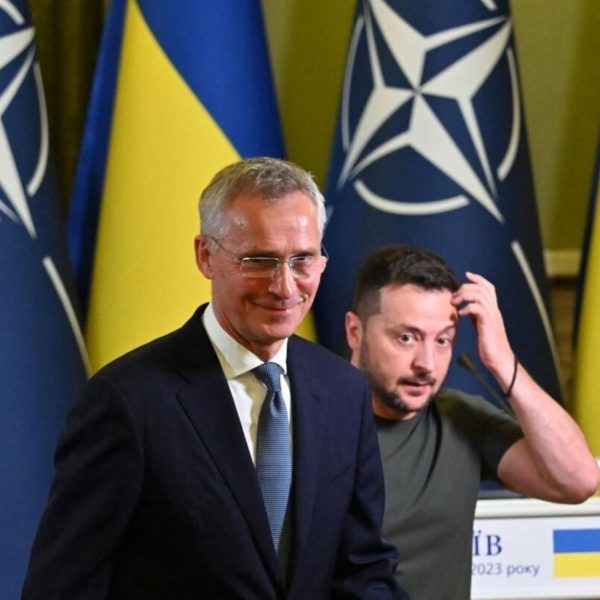
Finian Cunningham
On both sides of the Atlantic, there is now discernible fatigue and anger among citizens over NATO's proxy war in Ukraine against Russia.
On both sides of the Atlantic, there is now discernible fatigue and anger among citizens over the bottomless money pit that is NATO's proxy war in Ukraine against Russia.
The only wonder is that it has taken so long for the Western public to get wise to the scam.
The disgraceful adulation of a Nazi war criminal by the whole Canadian parliament in a perverse show of solidarity with Ukraine against Russia has helped focus public attention on the obscenity of the NATO proxy war.
All told, since the NATO-induced conflict blew up in February last year, the American and European establishments have thrown up to €200 billion into Ukraine to prop up an odious Nazi-infested regime.
All that largesse that is billed to U.S. and European taxpayers has resulted in a slaughter in Europe not seen since the Second World War - and a failed Ukrainian state. And of course huge profits for the NATO military-industrial complex that bankrolls the elite politicians.
Times are changing though. In the United States, the financially conservative Republicans have had enough of the blank checks to the Kiev regime. The U.S. Congress finally showed a modicum of sanity to prevent a government financial shutdown - by dropping military aid to Ukraine. That shows how twisted Washington's priorities have become when national self-interest has to wrestle with funding for a Nazi regime.
And then following the Congressional vote to temporarily end funding for Ukraine, the Kiev regime's foreign minister Dmytro Kuleba dared to reprimand American lawmakers: "We are now working with both sides of Congress to make sure that it does not (get) repeated under any circumstances."
Meanwhile in Europe, Slovakian citizens have voted for a new government to end the military fueling of war in Ukraine. The Smer-SD party led by Robert Fico won the parliamentary elections primarily on the vow to shut off any further weapons supply to the Kiev regime.
This week also saw massive protests in Germany against Olaf Scholz's coalition government over the latter's abject pro-war policies in Ukraine. German Unity Day on October 3 prompted a mass rally in Berlin denouncing the NATO proxy war in Ukraine and calling for peace negotiations to end the conflict.
There were also unprecedented protests across Poland in Warsaw, Lodz and other cities against the PiS government's slavish implementation of the U.S.-led NATO proxy war in Ukraine. Faced with millions of Ukrainian refugees and neglect of social needs for Poles, the PiS ruling party has recently threatened to end weapons supply to Kiev - a move less about principle and more about trying to buy votes in the forthcoming election on October 15. Nevertheless, the belated move by the Polish government illustrates the concern among European leaders about growing public disdain over the seemingly endless financial aid allocated to Ukraine.
Josep Borrell, the European Union's top diplomat, says it is a "worrying" sign that Washington for the first time closed the coffers for Ukraine.
The EU foreign ministers held a summit in Kiev on Monday. It was the first time that their summit was convened in a non-EU country. The agenda was a little too self-conscious, slated as a show of "solidarity" with Ukraine.
Borrell and the other EU diplomats said the summit was a warning to Russia to not count on "weariness" among Europeans over support for Ukraine. Who is he trying to convince? Russia or Europeans?
The unelected European elites described the war in Ukraine as an "existential crisis" which requires never-ending support for the Nazi regime against Russia.
Such melodrama needs serious qualification. The conflict is only "existential" for certain people: the NATO ideologues, the elitist leaders, the military-industrial complex, and the corrupt Nazi regime in Kiev. But it's not existential for most other people who want to end this insane slaughter, grotesque wasting of public finances, and perilous flirting with nuclear war.
Significantly, the contrived EU summit in Kiev was not attended by Hungary's foreign minister Peter Szijjarto. In highly critical comments on the EU's misplaced priorities, he said that other countries do not understand why Europe "has made this conflict global" and why people living in Asia, Africa and Latin America have to pay for it due to growing inflation, energy prices and unstable food supplies.
The Hungarian diplomat slammed the EU leaders for their double standards and hypocrisy, adding: "I can say that the world outside Europe is already really looking forward to the end of this war because they do not understand many things. They do not understand, for example, how it can be that when a war is not in Europe, the European Union, looking down with fantastic moral superiority, calls on the parties to peace, advocates negotiations and an immediate end to violence. However, when there is a war in Europe, the European Union incites the conflict and supplies weapons, and anyone who talks about peace is immediately stigmatized."
At least two members of the EU and the NATO alliance - Hungary and Slovakia's new government - are opposed to the absurd military and financial support fueling the war in Ukraine. Both countries want peace negotiations with Russia to be prioritized. There is an unavoidable sense that this common sense dissent will grow into a domino effect because it is the truth and has an unassailable moral force.
What the conflict in Ukraine has demonstrated clearly to the Western public is just how morally bankrupt their governments and media have become. American and European elitist leaders may kid themselves a little longer by pretending there is no weariness and fatigue over their proxy war against Russia. The more they pretend the greater the eventual crash and downfall from public anger.